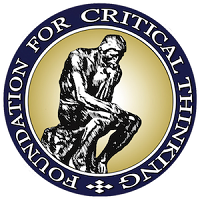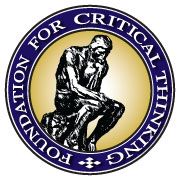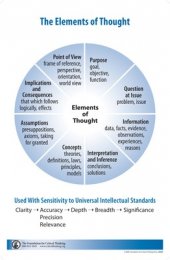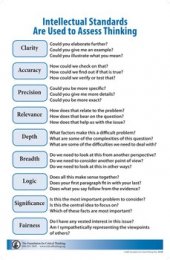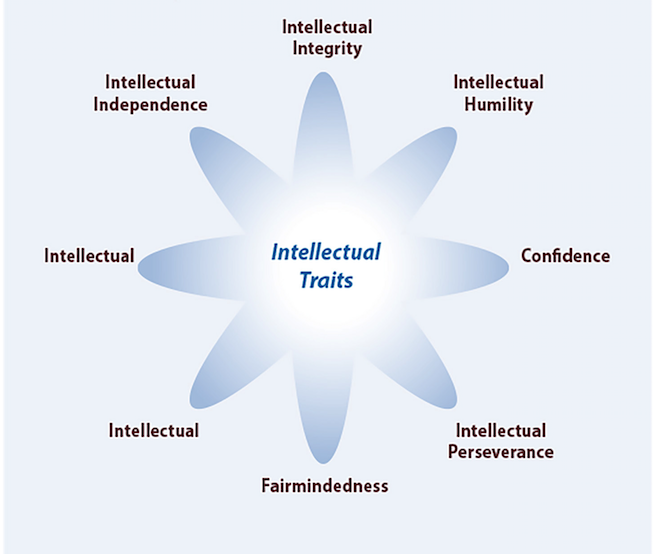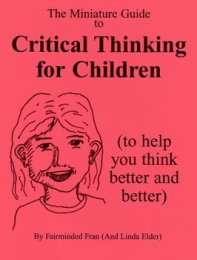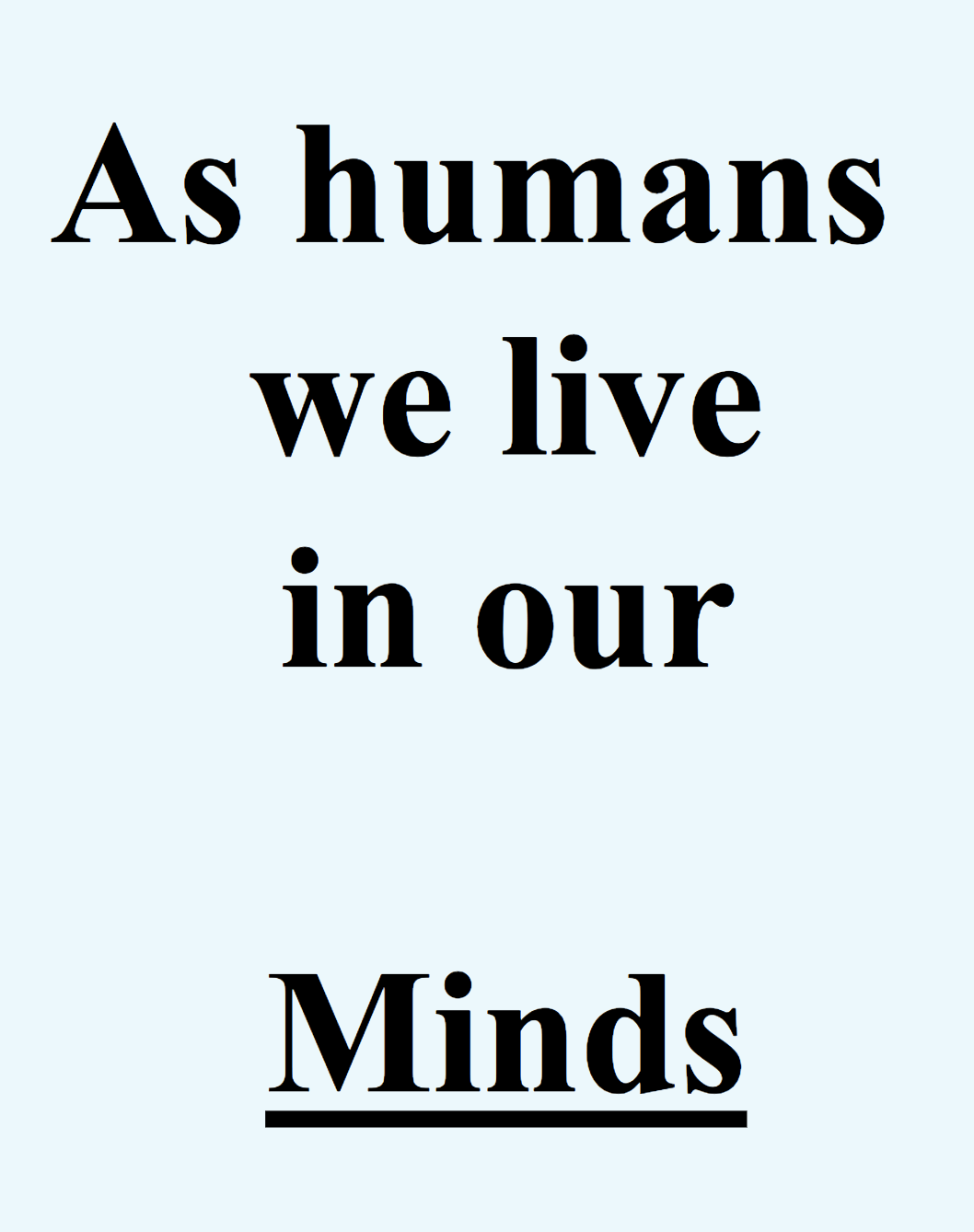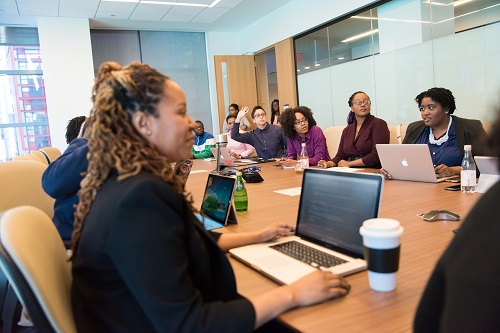
Audio and Video Library
You may already be familiar with some of our videos, released in varying formats over the decades, featuring seminal critical thinking lecture footage of the late Dr. Richard Paul and other Fellows and Visiting Scholars of the Foundation for Critical Thinking. What many don't realize is that we maintain an archive of hundreds of hours of additional footage from years of presentation and dialogue that have never before been published, and are now being added. These include:
These are being published in addition to all our classic videos of Dr. Richard Paul and other presenters. The hundreds of hours of content being offered here provide the potential basis for thousands of hours of study on the part of the viewer; it is our pleasure to offer the world's most comprehensive critical thinking AV library.
- Keynote speeches and in-session lectures from various years of the Annual International Conference on Critical Thinking.
- Senior Fellows Dr. Linda Elder and Dr. Gerald Nosich in conversation with distinguished scholars and activists such as Dr. Daniel Ellsberg, Mr. Ralph Nader, and Dr. Carol Tavris.
- Footage of Dr. Linda Elder giving in-depth presentations on the Elements of Thought, Intellectual Standards, and Intellectual traits, formerly only available through exclusive courses.
- ...and much more!
These are being published in addition to all our classic videos of Dr. Richard Paul and other presenters. The hundreds of hours of content being offered here provide the potential basis for thousands of hours of study on the part of the viewer; it is our pleasure to offer the world's most comprehensive critical thinking AV library.
Video Series
Richard Paul's Classic "How to Teach" Series
All subjects have a logic to them. Each is a system of meanings that enables us to reason effectively. Yet, most students try to learn not by reason, but by rote memorization. They blindly memorize someone else’s answers. Even when they do well on tests, it isn’t because they truly understand. True understanding requires disciplined reasoning. The How to Teach Series offers a penetrating, in-depth look at ways to cultivate intellectually powerful minds. This series of nine one-hour videos, featuring Dr. Richard Paul, focuses on how to break out of the didactic mode, taking viewers on a journey into a new paradigm for instruction that explicitly fosters reasoned learning; learning that accesses the inner logic of all substantive inquiry. Whatever your subject, the How to Teach Series is an essential guide to help you put reason, accountability, and transformation into teaching and learning.
View Videos in the Series
All subjects have a logic to them. Each is a system of meanings that enables us to reason effectively. Yet, most students try to learn not by reason, but by rote memorization. They blindly memorize someone else’s answers. Even when they do well on tests, it isn’t because they truly understand. True understanding requires disciplined reasoning. The How to Teach Series offers a penetrating, in-depth look at ways to cultivate intellectually powerful minds. This series of nine one-hour videos, featuring Dr. Richard Paul, focuses on how to break out of the didactic mode, taking viewers on a journey into a new paradigm for instruction that explicitly fosters reasoned learning; learning that accesses the inner logic of all substantive inquiry. Whatever your subject, the How to Teach Series is an essential guide to help you put reason, accountability, and transformation into teaching and learning.
View Videos in the Series
Conference Keynote Addresses and Focal Sessions
This video collection is a compilation of keynote addresses and focal sessions from our Annual International Conferences on Critical Thinking. In this series, our Fellows and scholars provide the foundations for critical thinking as well as personal examples of how critical thinking has helped them inside and outside the classroom. We also feature in this section keynote addresses delivered through our Bertrand Russell Scholars program.
View Videos in the Series
This video collection is a compilation of keynote addresses and focal sessions from our Annual International Conferences on Critical Thinking. In this series, our Fellows and scholars provide the foundations for critical thinking as well as personal examples of how critical thinking has helped them inside and outside the classroom. We also feature in this section keynote addresses delivered through our Bertrand Russell Scholars program.
View Videos in the Series
Assessment
In this video collection viewers are introduced to the fundamental logic of all assessment: goals, facts, criteria, standards, reasoning, and application. An assessment checklist is developed. The advantages and disadvantages of available critical thinking tests are presented and discussed. A case is made for the use of the International Critical Thinking Essay Test. Richard Paul demonstrates how a testing program can be coordinated with faculty development and programmatic assessment. Dr. Paul and other scholars explain and illustrate how to teach students to assess each other’s work. Questions are addressed and in addition ample theory and application are provided throughout.
View Videos in the Series
In this video collection viewers are introduced to the fundamental logic of all assessment: goals, facts, criteria, standards, reasoning, and application. An assessment checklist is developed. The advantages and disadvantages of available critical thinking tests are presented and discussed. A case is made for the use of the International Critical Thinking Essay Test. Richard Paul demonstrates how a testing program can be coordinated with faculty development and programmatic assessment. Dr. Paul and other scholars explain and illustrate how to teach students to assess each other’s work. Questions are addressed and in addition ample theory and application are provided throughout.
View Videos in the Series
Socratic Questioning
The Socratic Questioning video series, featuring Dr. Richard Paul, was created to teach instructors at all levels of education how to bring one of the oldest and still most powerful teaching techniques into the classroom. Whereas traditional instruction is concerned with giving students answers, Socratic questioning recognizes that questions, not answers, are the driving force in thinking. Feeding students endless content to remember is akin to repeatedly stepping on the brakes in a vehicle that is, unfortunately, already at rest. Instead, students need to turn on their intellectual engines. Only when answers generate further questions does thought remain alive. Only students who have questions are really thinking and learning. The quality of the questions we ask determines the quality of the thinking we do.
View Videos in the Series
The Socratic Questioning video series, featuring Dr. Richard Paul, was created to teach instructors at all levels of education how to bring one of the oldest and still most powerful teaching techniques into the classroom. Whereas traditional instruction is concerned with giving students answers, Socratic questioning recognizes that questions, not answers, are the driving force in thinking. Feeding students endless content to remember is akin to repeatedly stepping on the brakes in a vehicle that is, unfortunately, already at rest. Instead, students need to turn on their intellectual engines. Only when answers generate further questions does thought remain alive. Only students who have questions are really thinking and learning. The quality of the questions we ask determines the quality of the thinking we do.
View Videos in the Series
Elements of Reasoning
There are essential dimensions of thinking that humans need to master in order to learn how to deconstruct and upgrade their thinking. People need to be able to identify the "parts" of their thinking and assess their use of these parts of thinking, as follows: • All reasoning has a purpose • All reasoning is an attempt to figure something out, to settle some question, to solve some problem • All reasoning is based on assumptions • All reasoning is done from some point of view • All reasoning is based on data, information, and evidence • All reasoning is expressed through, and shaped by, concepts and ideas • All reasoning contains inferences by which we draw conclusions and give meaning to data • All reasoning leads somewhere, has implications and consequences This video collections unpacks the elements of reasoning and explains how they are essential to reasoning through content, and within all parts of life.
View Videos in the Series
There are essential dimensions of thinking that humans need to master in order to learn how to deconstruct and upgrade their thinking. People need to be able to identify the "parts" of their thinking and assess their use of these parts of thinking, as follows: • All reasoning has a purpose • All reasoning is an attempt to figure something out, to settle some question, to solve some problem • All reasoning is based on assumptions • All reasoning is done from some point of view • All reasoning is based on data, information, and evidence • All reasoning is expressed through, and shaped by, concepts and ideas • All reasoning contains inferences by which we draw conclusions and give meaning to data • All reasoning leads somewhere, has implications and consequences This video collections unpacks the elements of reasoning and explains how they are essential to reasoning through content, and within all parts of life.
View Videos in the Series
Intellectual Standards
This video collection explores universal intellectual standards. Intellectual standards are standards which must be applied to thinking whenever you need to check the quality of reasoning about a problem, issue, or situation. To think critically entails having command of these standards. To help learn them, you should pose questions which probe thinking; questions which hold you and others accountable for the thinking being done; questions which, through consistent use become internalized as questions you routinely ask in order to check and improve thinking. The ultimate goal, then, is for these questions to become infused in your thinking, forming part of your inner voice, which then guides you to better and better reasoning.
View Videos in the Series
This video collection explores universal intellectual standards. Intellectual standards are standards which must be applied to thinking whenever you need to check the quality of reasoning about a problem, issue, or situation. To think critically entails having command of these standards. To help learn them, you should pose questions which probe thinking; questions which hold you and others accountable for the thinking being done; questions which, through consistent use become internalized as questions you routinely ask in order to check and improve thinking. The ultimate goal, then, is for these questions to become infused in your thinking, forming part of your inner voice, which then guides you to better and better reasoning.
View Videos in the Series
Intellectual Virtues
Critical thinking is not just a set of intellectual skills. It is a way of orienting oneself in the world, and a way of approaching problems that differs significantly from that which is typical in human life. People may have critical thinking skills and abilities, yet still be unable to enter viewpoints with which they disagree. They may have critical thinking abilities, yet still be unable to analyze the beliefs that guide their behavior. They may have critical thinking abilities, yet be unable to distinguish between what they know and what they don’t, to persevere through difficult problems and issues, to think fairmindedly, and to stand alone against the crowd. This video collection focuses on intellectual traits that transform the mind - virtues that foster the development of fairmindedness, intellectual humility, intellectual perseverance, intellectual courage, intellectual empathy, intellectual autonomy, intellectual integrity, and confidence in reason.
View Videos in the Series
Critical thinking is not just a set of intellectual skills. It is a way of orienting oneself in the world, and a way of approaching problems that differs significantly from that which is typical in human life. People may have critical thinking skills and abilities, yet still be unable to enter viewpoints with which they disagree. They may have critical thinking abilities, yet still be unable to analyze the beliefs that guide their behavior. They may have critical thinking abilities, yet be unable to distinguish between what they know and what they don’t, to persevere through difficult problems and issues, to think fairmindedly, and to stand alone against the crowd. This video collection focuses on intellectual traits that transform the mind - virtues that foster the development of fairmindedness, intellectual humility, intellectual perseverance, intellectual courage, intellectual empathy, intellectual autonomy, intellectual integrity, and confidence in reason.
View Videos in the Series
Critical Thinking for Children
This video series contains a brief introduction and three segments, each approximately five minutes long: "Standards of Thinking" explains such guidelines as "Be clear" and "Be logical." "The Parts of Thinking" includes components such as questions and assumptions. "Intellectual Virtues" discusses such qualities as integrity and perseverance.
View Videos in the Series
This video series contains a brief introduction and three segments, each approximately five minutes long: "Standards of Thinking" explains such guidelines as "Be clear" and "Be logical." "The Parts of Thinking" includes components such as questions and assumptions. "Intellectual Virtues" discusses such qualities as integrity and perseverance.
View Videos in the Series
The Human Mind and the Problems of Egocentric and Sociocentric Thought
Since human emotions and desires are generally controlled by thoughts, understanding our thoughts is essential to personal and societal advancement. This video collection focuses on the problems in thinking that arise from the innate human egocentric and sociocentric behaviors. These videos delve into the core functions of the human mind to allow viewers to take charge of their intellect and emotions more effectively. Fellows and scholars of the Foundation for Critical Thinking explore the basic impulses that influence our thoughts and can distract us from logical or ethical action. Exploring the dangers of egocentric and sociocentric thinking, this series presents strategies for strengthening emotional intelligence and developing critical thinking virtues.
View Videos in the Series
Since human emotions and desires are generally controlled by thoughts, understanding our thoughts is essential to personal and societal advancement. This video collection focuses on the problems in thinking that arise from the innate human egocentric and sociocentric behaviors. These videos delve into the core functions of the human mind to allow viewers to take charge of their intellect and emotions more effectively. Fellows and scholars of the Foundation for Critical Thinking explore the basic impulses that influence our thoughts and can distract us from logical or ethical action. Exploring the dangers of egocentric and sociocentric thinking, this series presents strategies for strengthening emotional intelligence and developing critical thinking virtues.
View Videos in the Series
Personal & Professional Life
To live is to act. To act is to decide. Everyday work and life are an endless sequence of decisions. Some of the decisions are small and inconsequential, and some are large and life-determining. When your patterns of decision-making are rational, you live a rational life. When your patterns are irrational, you live an irrational life. Rational decisions maximize the quality of your life and your chances of happiness, successful living, and fulfillment. Critical thinking improves your decision-making abilities by raising your patterns of decision-making to the level of conscious and deliberate choice. Critical thinking, when deeply understood, enables you to take control of the thinking you are doing in every part of your life. It enables you to solve problems more effectively, make better decisions, as well as recognize pathological and manipulative thinking.
View Videos in the Series
To live is to act. To act is to decide. Everyday work and life are an endless sequence of decisions. Some of the decisions are small and inconsequential, and some are large and life-determining. When your patterns of decision-making are rational, you live a rational life. When your patterns are irrational, you live an irrational life. Rational decisions maximize the quality of your life and your chances of happiness, successful living, and fulfillment. Critical thinking improves your decision-making abilities by raising your patterns of decision-making to the level of conscious and deliberate choice. Critical thinking, when deeply understood, enables you to take control of the thinking you are doing in every part of your life. It enables you to solve problems more effectively, make better decisions, as well as recognize pathological and manipulative thinking.
View Videos in the Series
Webinars
Webinars hosted by the Foundation for Critical Thinking, dealing with different aspects and applications of critical thinking.
View Videos in the Series
Webinars hosted by the Foundation for Critical Thinking, dealing with different aspects and applications of critical thinking.
View Videos in the Series
Critical Reading & Writing
Educated persons are skilled at, and routinely engage in, close reading. When reading, they seek to learn from texts. They generate questions as they read, and they seek answers to those questions by reading widely and skillfully. In short, they seek to become better educated through reading. They do this through the process of intellectually interacting with the texts they read, while they are reading. Educated persons skillfully, routinely engage in substantive writing. Substantive writing consists of focusing on a subject worth writing about, and then saying something worth saying about it. It also enhances our reading: whenever we read to acquire knowledge, we should write to take ownership of what we are reading. Furthermore, just as we must write to gain an initial understanding of a subject's primary ideas, so also must we write to begin thinking within the subject as a whole and making connections between ideas within and beyond it.
View Videos in the Series
Educated persons are skilled at, and routinely engage in, close reading. When reading, they seek to learn from texts. They generate questions as they read, and they seek answers to those questions by reading widely and skillfully. In short, they seek to become better educated through reading. They do this through the process of intellectually interacting with the texts they read, while they are reading. Educated persons skillfully, routinely engage in substantive writing. Substantive writing consists of focusing on a subject worth writing about, and then saying something worth saying about it. It also enhances our reading: whenever we read to acquire knowledge, we should write to take ownership of what we are reading. Furthermore, just as we must write to gain an initial understanding of a subject's primary ideas, so also must we write to begin thinking within the subject as a whole and making connections between ideas within and beyond it.
View Videos in the Series
Instructional Strategies and Techniques
Students learn content within any subject only to the extent that they learn to think through the subject using their own thinking. But they can’t just use their own thinking. They have to use skilled, disciplined, reasonable, rational thinking - in other words, critical thinking.
View Videos in the Series
Students learn content within any subject only to the extent that they learn to think through the subject using their own thinking. But they can’t just use their own thinking. They have to use skilled, disciplined, reasonable, rational thinking - in other words, critical thinking.
View Videos in the Series
Critical Thinking in Educational Administration
Implementation of critical thinking processes and curriculum in educational administration.
View Videos in the Series
Implementation of critical thinking processes and curriculum in educational administration.
View Videos in the Series
Critical Thinking in Social and Environmental Issues
Critical thinking applied to issues affecting society and the environment.
View Videos in the Series
Critical thinking applied to issues affecting society and the environment.
View Videos in the Series
Interviews with Fellows and Scholars
Interviews of the Foundation for Critical Thinking's Fellows and Scholars.
View Videos in the Series
Interviews of the Foundation for Critical Thinking's Fellows and Scholars.
View Videos in the Series
"Critical Thinking: Going Deeper" Podcast
In the "Critical Thinking: Going Deeper" podcast, Drs. Linda Elder and Gerald Nosich explore deeper layers of critical thinking theory than what is typically covered in our publications, videos, and conferences.
View Videos in the Series
In the "Critical Thinking: Going Deeper" podcast, Drs. Linda Elder and Gerald Nosich explore deeper layers of critical thinking theory than what is typically covered in our publications, videos, and conferences.
View Videos in the Series
"Critical Thinking Revealed" Podcast
In the "Critical Thinking Revealed" podcast, we interview those who have shown exceptional reasoning in a given area and explicate the examples of critical thinking therein.
View Videos in the Series
In the "Critical Thinking Revealed" podcast, we interview those who have shown exceptional reasoning in a given area and explicate the examples of critical thinking therein.
View Videos in the Series
Classic Richard Paul Lectures and Speeches
This collection features never-before-published audio recordings of Dr. Richard Paul's lectures and speeches from past decades. These include lectures in his Sonoma State University courses and keynote addresses from the Annual International Conference on Critical Thinking.
View Videos in the Series
This collection features never-before-published audio recordings of Dr. Richard Paul's lectures and speeches from past decades. These include lectures in his Sonoma State University courses and keynote addresses from the Annual International Conference on Critical Thinking.
View Videos in the Series
